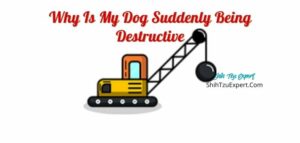Dogs can display a variety of destructive behaviors, from digging to scratching to chewing. This article goes through possible causes for these behaviors, when they aren’t normal, and what you can do to deter the behaviors.

Is My Dog Just Going Through A Destructive Phase?
For dogs, destructive behavior entails damage done outside of appropriate outlets, such as bones or toys. This includes scratching up furniture, damaging doors or walls, and having “accidents” in the house.
PetMD distinguishes between primary and secondary destructive behavior. Primary destructive behavior is when the dog causes damage but has no other symptoms. Secondary destructive behavior when the dog has other symptoms, like anxiety or aggressive behavior.
Why Is My Dog Suddenly Being Destructive?

Just Going Through A Destructive Phase
Destructive phases can be normal for dogs. They might just be playing or exploring. Even if your dog has no other symptoms besides tearing up your furniture, you should still pay attention to your dog because destructive behavior can lead to problems with their organs (such as their teeth or skin).
Trying To Get Your Attention!
Your dog might just be trying to get your attention. And, let’s be fair, destructive behavior is pretty attention-catching. However, any attention you give them for it (even negative) will encourage them to do it again. They’ll see destructive behavior as an effective tool for getting your attention.
Stress
Your dog may be expressing its anxiety. If this is the case, you might want to see if something is triggering your dog’s destructive behavior, such as loud noises like thunder.
Destructive behavior in dogs is also a symptom of OCD. This could be caused by discomfort, excessive periods of confinement, or some other neurochemical imbalance or environmental stressor.
Symptoms of OCD-related destructive behavior include:
- Excessive licking or chewing things or their legs or feet
- Pica (frequent eating of non-food objects)
If you think your dog has OCD, bring them to the vet. Once the diagnosis is confirmed, your vet will be able to prescribe medication and a new training regimen.
Boredom
When your dog is bored, they will try to find a way to stay occupied. Destructive behavior is easy because all it requires is themselves (or their teeth or their paws) and your stuff.
If it’s boredom, your dog will probably express disinterest, abnormal behavior (such as excessive licking), or destructive behavior.
It’s Become A Bad Habit
A lack of proper training could result in your dog not having impulse control. Thus, they can’t resist destroying your things. Worse, you may have been unintentionally encouraging it by giving them the attention you want.
It’s important to teach your dog that this kind of behavior isn’t okay. Do not encourage it in any way. Use positive reinforcement. Talk to your vet for advice on how to change the way you train your dog.
Separation Anxiety
Many dogs have separation anxiety, meaning that they are overly attached to their owners. One way separation anxiety can manifest is that when the owner leaves the dog alone, the dog takes out their anxiety on the owner’s property. They may also try to damage the door in an attempt to escape.
Symptoms of separation anxiety-related destructive behavior include:
- Going to the bathroom inside even after being housebroken
- Destroying doors or windows
- Destruction almost every time the owner leaves the dog alone
If you think your dog has separation anxiety, you should consult your vet for advice.
Dog Is Unwell
Sometimes, dogs engage in destructive behavior because they’re trying to get your attention. One of the reasons they might be trying to get your attention is that they’re not feeling well.
If this is the case, they’ll have other symptoms like:
- Biting or nipping paws
- Excessive drooling
- Excessive drinking or eating
- Loss of appetite
Puppy Is Teething
Puppies’ teeth for up to two years. The teeth coming causes pain and discomfort. Puppies will chew on things in hopes of relieving that pain.
You might also consider giving your puppy ice or frozen toys to chew on. Some say that giving the puppy something cold enough to chew on may numb the pain.
Tooth Ache / Infection In The Mouth
Similar to teething, dogs will chew to relieve their mouth pain.
If your dog has mouth pain, talk to your vet. They may be able to prescribe a special gel to relieve your dog’s pain.
Lack Of Exercise
A study of 94 dogs found that a lack of exercise can lead to destructive behavior.
So, make sure your dog is getting enough exercise. Daily walks, trips to the dog park, tug-of-war, fetch, etc. are all good ways for your dog to get exercise.
Too Much Pent-Up Energy
If your dog doesn’t get enough exercise or mental stimulation during the day, they will have a lot of pent-up energy at the end of the day. They will find a way to get that energy out, including through destructive behavior.
Toys Are The Wrong Type
If you get the wrong type of toy for your dog, your dog will reject them and try to find something else to chew on. Give your dog chew toys with different textures and shapes so you can get an idea of what kind of toy they’d prefer.
How Do I Stop My Dog From Destroying The Couch/Chairs/Beds/Furniture?
Keep The Dog Busy
Your dog needs to have access to physical and mental stimulation. If your dog is worn out from the day, they won’t have the energy to destroy things in your house. Besides getting enough exercise, your dog should have a variety of toys to keep themselves entertained.
Keep The Dog Exercised
Your dog needs exercise. Take them on regular walks. Try other outdoor activities like playing fetch or running.
Keep The Dog Mentally Stimulated
Chewing is normal for a dog. The trick is to make sure they concentrate their chewing efforts on toys, not furniture. The toys will keep your dog mentally stimulated.
It’s better to get a durable toy that your dog won’t be able to break easily so it’ll last a long time. Toys with ridges have been known to prevent the buildup of tartar and plaque.
Dog Trainer
A dog trainer can help redirect your dog so they chew on appropriate things, like toys or bones, instead of things you don’t want them chewing on.
If you don’t get a referral from your vet, look for trainers who are certified by the Certified Council for Professional Dog Trainers or the International Association of Animal Behavior Consultants.
Veterinarian
The vet can conduct several tests to help identify the cause of your dog’s destructive behavior, ranging from pica to brain disease. Sometimes, the vet will bring in a veterinary behaviorist to help with the diagnosis. Once the vet figures out what’s wrong, they can start treatment. If the cause is linked to a disease, treatment will focus on that disease.
Do All Dogs Go Through A Rebellious Stage?
Dogs go through a rebellious phase the way humans do, testing the limits of what their owners will and will not accept. It is important to be firm and consistent when setting rules and boundaries with your dog.
Why Is My One-Year-Old Dog Suddenly Chewing Everything Up?
Your dog is likely teething and trying to relieve itself of the pain.
It is also possible that your one-year-old was weaned too early (before seven or eight weeks post-birth). This can cause your dog to chew on fabrics.
What Age Are Dogs Most Destructive?
According to the American Kennel Club, most dogs will go through their “rebellious” stage when they’re between the ages of five months and 18 months. However, this likely varies by breed.
How Do You Discipline A Dog After Destructive Behavior?
Do not yell at or punish your dog because it will send the wrong message. Studies have found that punishment leads to more stress in dogs. Your dog isn’t rational enough to understand that you’re mad about their behavior. They live in the moment, so they won’t link your anger to what they did wrong. Your anger will just scare them off.
Do not use crating as a punishment. Your dog should see their crate as a place of comfort, not their own personal jail. You may want to crate your dog if they’re only destructive when you’re not around, but this should not be a punishment, just a preventative measure.
Why Is My Older Dog Being Destructive?
If your older dog is chewing destructively, they might be having gastrointestinal problems or dental problems. They may also be trying to keep their teeth clean; dogs chew on bones instead of brushing their teeth.
How Do You Calm A Destructive Dog?
The best way to calm your dog is to figure out what is causing the destructive behavior. If they’re having anxiety because of a thunderstorm, for example, you should try to block out the sound. There are also calming sprays that will induce a sense of calm in your dog.
What Is The Most Destructive Dog Breed?
There is no objective assessment for the most destructive dog breed. However, collies are known for their chewing and Shih Tzus are known for digging in the ground.
Dog Suddenly Destructive When Left Alone?
If your dog is suddenly destroying things when they are left alone, it is probably due to separation anxiety.
Look out for these symptoms:
- Attempting to escape the crate
- Excessive drooling
- Excessive howling, barking, etc
- Expressing distress when you’re about to leave
- Pacing
- Panting
- Peeing or pooping in the house
Why Is My Dog Suddenly Destroying Its Toys?
Your dog could be teething or feeling unwell. They might also be compulsively chewing due to stress or frustration. You should try to find more durable toys.
Dog Being Destructive At Night?
Your dog may be restless from not having expended enough energy throughout the day. See above for tips on how to get your dog enough stimulation, both physically and mentally.
They may also just be trying to get your attention. If you’ve given them attention before for destructive behavior, you’ve given them a reason to think this would work. It is important not to reward them with attention for bad behavior.
To reduce this behavior, make sure your dog has everything they need before bedtime. Let them go to the bathroom one last time, and make sure they’ve eaten dinner. They should only be trying to get your attention at night for emergencies.
Why Does My Dog Only Chew And Destroy My Stuff?
Destructive chewing can have any number of sources, from stress or boredom to separation anxiety or pain. Make sure to encourage healthy chewing behaviors in your dog by providing them with chew toys and redirecting them as necessary. Feed your dog regularly, give them appropriate physical exercise every day, and take them for walks.
References
https://www.ncbi.nlm.nih.gov/pmc/articles/PMC8479053/
https://www.ncbi.nlm.nih.gov/pmc/articles/PMC8868415/



![Best Cheap Dog Foods - our Top 10 Picks of High Quality Brands That Are Still Affordable [Under $1 per pound!] in 2023 Best Cheap Dog Foods - our Top 10 Picks of High Quality Brands That Are Still Affordable [Under $1 per pound!] in 2023](https://shihtzuexpert.com/wp-content/uploads/2018/01/Best-Cheap-Dog-Food-Featured-image.png)
